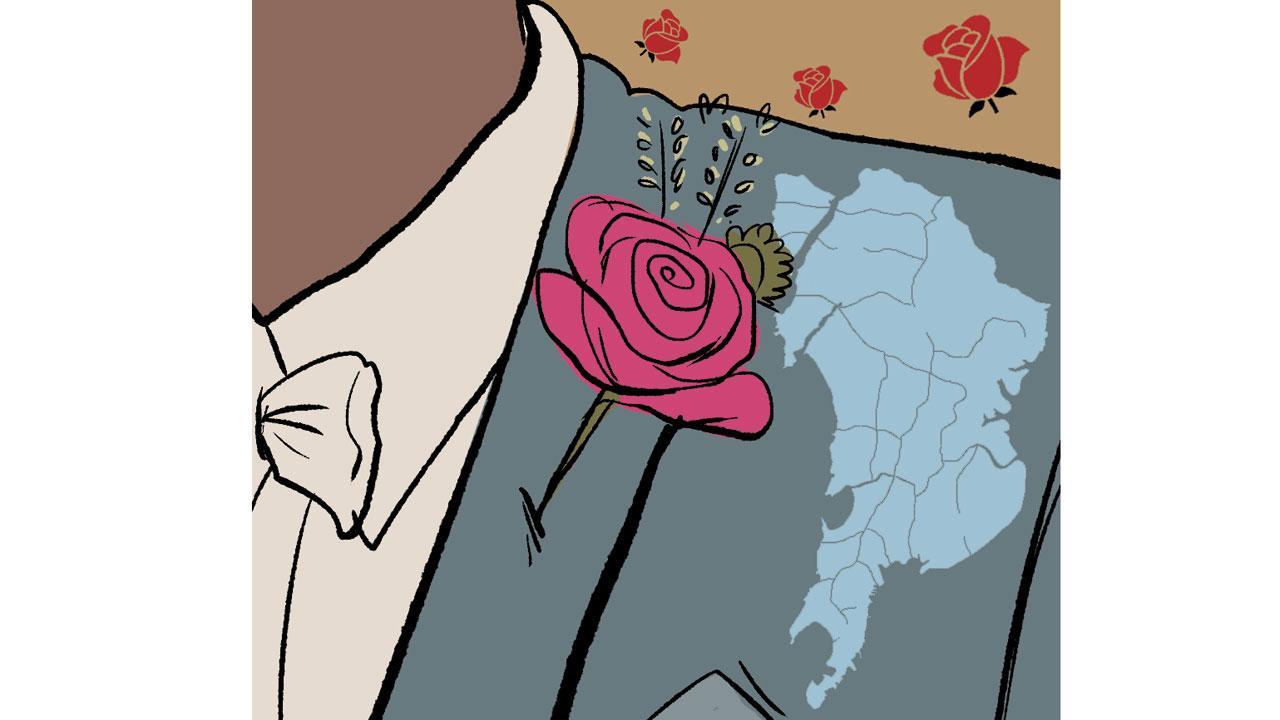As we quietly observe each other, we also reveal ourselves to each other, across crowded trains and tube-lit windows. Watcher and watched in one frame, in a kind of equality

Illustration/Uday Mohite
![]() Imagine the densely intensely layered Bombay in a Sudhir Patwardhan painting. Imagine if you touche a part of the painting-a xerox shop perhaps, or a photo studio, a boy tenderly watering a plant in a Vanaspati ti— and it rippled into life. The boy momentarily catches your gaze and goes in and you watch as he tends the ghar-ki-baby as sweetly as he does the flowering plant. The young disabled woman in a photo studio glances at you wryly before she proceeds to perform her disability before the camera for a government document. The best friend at a wedding begins speaking, “Mandarmala Sakhardande Bhabiji, I will from now on only call you Bhabiji because your real name is longer than the title of Rajshri Pictures’ Dulhan Wahi Jo Piya Man Bhaye.” Bombay comes alive in its quixotic variety.
Imagine the densely intensely layered Bombay in a Sudhir Patwardhan painting. Imagine if you touche a part of the painting-a xerox shop perhaps, or a photo studio, a boy tenderly watering a plant in a Vanaspati ti— and it rippled into life. The boy momentarily catches your gaze and goes in and you watch as he tends the ghar-ki-baby as sweetly as he does the flowering plant. The young disabled woman in a photo studio glances at you wryly before she proceeds to perform her disability before the camera for a government document. The best friend at a wedding begins speaking, “Mandarmala Sakhardande Bhabiji, I will from now on only call you Bhabiji because your real name is longer than the title of Rajshri Pictures’ Dulhan Wahi Jo Piya Man Bhaye.” Bombay comes alive in its quixotic variety.
Reading Jayant Kaikini’s stories feels a bit like this. At the launch of the second collection—Mithun Number Two and Other Bombay Stories—translated with deft delight by Tejaswini Niranjana, we asked the question, what makes a story a Bombay story? Shanta Gokhale responded with “we all live in a different Bombay. We all write our own Bombay’s stories.” “Bombay is such a city”, said Kaikini “I am sweating and someone is wiping his face next to me. It is as if he is wiping my face.” This rhythm of the city, where we are joined through a kind of cinematic cut of humour, poignancy and coincidence, is what I think makes Bombay a city of fleeting intimacies. As we quietly observe each other, we also reveal ourselves to each other, across crowded trains and tube-lit windows. Watcher and watched in one frame, in a kind of equality.
Visual details pack Kaikini’s stories, each story like a pomegranate. A rose droops in a buttonhole, like a commuter sleeping on a Mumbai local. Someone settles into a salon chair and says “Mithun cut.” Chandu is greeted by his sister with a slap. Each observation seems like a clue, propelling us towards a truth we feel we know deep inside.
This detail functions very differently from detailing in certain post-globalisation work ‘about’ Bombay, which wish to be definitive. Suketu Mehta’s Maximum City could be considered a landmark of this turn along with ‘realistic’ fiction films, or character-driven documentaries favoured by international funding, festivals and prizes. These works seek to translate Bombay/India for a global audience on their terms- bar dances and shooters parallel torch singers and mafiosi, so that Bombay is like New York. The grittier the detail of violence and suffering, the more the claim to authenticity and political urgency, and maybe to Cannes and the Oscars, which ratify even for Indians, what to consider significant.
Kaikini’s observational detail seeks not to define his characters, or make them represent a social identity, but to help us inhabit a slice of time together, knowing them deeply but only for a moment. Whatever their hardships or loneliness, this intimacy never robs them of their chosen form of dignity, whether they express it through humour, style or poignancy. They are translated to us on their terms. It is a poetic realism, that seeks to liberate meaning, not capture it; a gaze of love and romance for the world, that helps us confront our own loneliness, and nevertheless find the world and ourselves beautiful and worth loving.
Paromita Vohra is an award-winning Mumbai-based filmmaker, writer and curator working with fiction and non-fiction. Reach her at paromita.vohra@mid-day.com
 Subscribe today by clicking the link and stay updated with the latest news!" Click here!
Subscribe today by clicking the link and stay updated with the latest news!" Click here!










